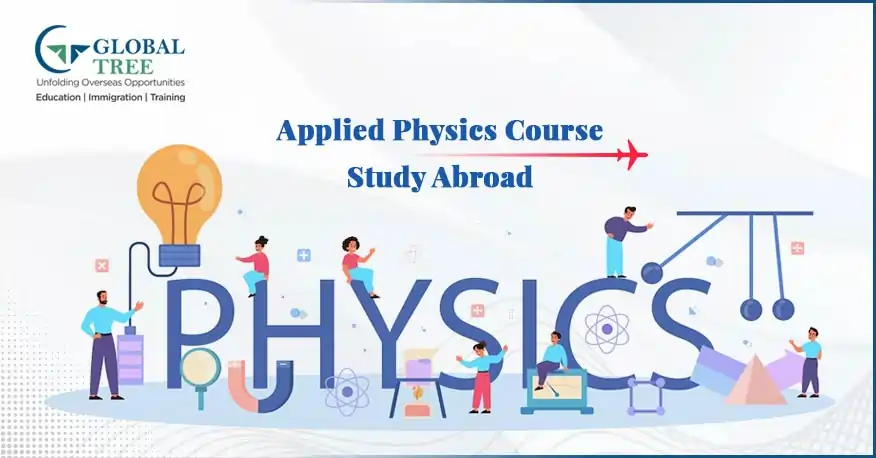Applied Physics Course to Study Abroad

Introduction
A combination of physics and engineering is known as applied physics. In order to create experiments and identify applications for the rules and theories of physics, it is necessary for students to be familiar with them. Using a physical idea like electricity to create light is an example of applied physics.
Core ideas including electricity and magnetism, optics, waves, thermodynamics, vibrations, and work with lasers are typically included in an applied physics degree. Oftentimes, research endeavors begin after a degree is earned. Choose the Best Applied Physics Course & Colleges to Study Abroad.
Who is eligible to study Applied Physics Course Abroad?
An Applied Physics degree is a perfect fit for you if you enjoy working with cutting-edge technology, designing experiments, and creating complex computer models to advance science. Even your lucrative research funding could result from further investigation. Students who enjoy discovering the possibilities of nature and have a curious mind can benefit from this degree.
How much does it cost to study Applied Physics Course Abroad?
A student must first get a bachelor's degree in physics, applied physics, or a related engineering discipline in order to graduate with an applied physics degree. The bachelor's program in Applied Physics is directly offered by select institutions, though. This degree takes four years to complete, and the average tuition and fees vary according to the top abroad universities you choose. Along with general relativity and laser physics, this stage will provide a thorough foundation in statistical mechanics, thermodynamics, computational, and quantum physics. After that, students can find employment as high school physics teachers and research assistants, both of which pay an average income of $55,192.
After completing this phase, it is advantageous for students to apply for research posts because this familiarizes them with the practical applications of their degree. With research experience, obtaining a master's or postgraduate degree is also simpler.
Postgraduate degrees emphasize research. The course demands a thorough examination, a thesis, and an oral defense. The cost of tuition can change depending on a number of variables, including discipline, duration, university, and city. The course lasts for two years and has an annual tuition cost between $30,000 and $35,000.
The next step is earning a doctorate after completing a master's degree. It normally lasts three to six years, and it concludes with a dissertation or thesis that includes an oral defense. The dissertation is built on a specific area of study. In the UK, the average total cost of tuition is close to $30,000. Students entering with a bachelor's degree will need to complete 36 hours of coursework, while those entering with a master's degree abroad will need to complete 18 hours of coursework.
Students can work as physicists in universities and research facilities after completing a Ph.D. A doctorate is the next degree to be obtained after a master's. It typically lasts between three and six years, and it comes to an end with a dissertation or thesis that involves an oral defense. The foundation of the dissertation is a particular field of study. The average tuition fee in the UK is close to $30,000. For individuals who are entering with a bachelor's degree, the coursework requirements are 36 hours, while for those with a master's degree, the requirements are 18 hours.
After earning a PhD, students can work as physicists in colleges and research facilities.
What is the Future Scope of Applied Physics Course Abroad?
There are many job options in applied physics, and the future is generally positive. Graduates in applied physics can find employment as professors and nuclear physicists in the public or commercial sectors. The US Bureau of Labour Statistics predicts a 9% increase in job prospects for physicists. Every year, 1500 job opportunities are anticipated. This, along with the widespread demand for technology breakthroughs, makes this job incredibly exciting and future-proof.
Trending Career Options in Applied Physics Course Abroad
Utilize your knowledge and transferrable abilities to explore a variety of professional pathways in applied physics
Career as a Meteorologists
The foundation of meteorology is a physics-based approach to comprehending the cosmos. In numerical analysis, global climate modeling, hydroelectricity, and air pollution, meteorologists are involved. Their yearly average pay in the US is $64,713.
Career as an Engineer in Aerospace Systems
Aerospace engineers create rockets, satellites, space observatories, and other space and airborne vehicles. They might even go on space adventures to physically install the equipment. Governments, businesses like SpaceX, or universities in the Ivy League with an Aerospace engineering course may hire them. To design effective projects, aerospace systems engineers study and interpret flight data. In the US, they make an average base pay of $99,158 annually.
Career as a Chemical Engineer
Process engineers create, manage, improve, and run a variety of procedures that turn raw resources into useable goods. Applied physics graduates have an edge in this situation because they can monitor how different raw materials interact to maximize the production process. In the US, their yearly average pay is $88,320.
Career as an Analyst of Data
In addition to examining computational models, data scientists also gather and organize unstructured data. They earn an annual average salary of $120,948 in the US.
Career as an Optical Engineer
They build numerous, incredibly accurate optical systems that are used by telescopes, cameras, and other lens-based equipment. To optimize the machinery, they calibrate and tweak the systems. Their annual average pay in the US is $113,912.
(Read more: Trending Career Options in Engineering Science Course Abroad)
Career as an Instructor in Physics
After receiving their doctorate, students with an Applied Physics degree can work as professors. They can carry on their research and mentor upcoming scientists. Their average base pay is $111,348 with a salary range of $83,138 to $180,274.


